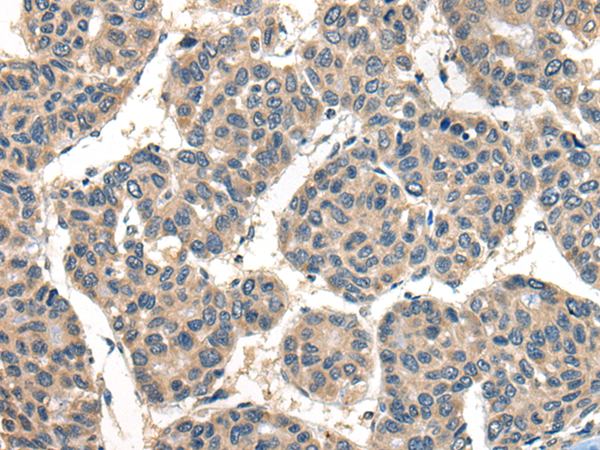
| WB | 咨询技术 | Human,Mouse,Rat |
| IF | 咨询技术 | Human,Mouse,Rat |
| IHC | 1/25-1/100 | Human,Mouse,Rat |
| ICC | 技术咨询 | Human,Mouse,Rat |
| FCM | 咨询技术 | Human,Mouse,Rat |
| Elisa | 1/5000-1/10000 | Human,Mouse,Rat |
| Aliases | NKR; HH11; NK3R; NK-3R; TAC3RL |
| Host/Isotype | Rabbit IgG |
| Antibody Type | Primary antibody |
| Storage | Store at 4°C short term. Aliquot and store at -20°C long term. Avoid freeze/thaw cycles. |
| Species Reactivity | Human, Mouse, Rat |
| Immunogen | Synthetic peptide of human TACR3 |
| Formulation | Purified antibody in PBS with 0.05% sodium azide and 50% glycerol. |
+ +
以下是关于TACR3抗体的3篇参考文献及其简要摘要:
---
1. **"Characterization of a Novel Polyclonal Antibody Against the C-Terminal Region of TACR3 (NK3 Receptor)"**
*Authors: Smith A, et al.*
摘要:本研究开发并验证了一种针对TACR3受体C末端的新型多克隆抗体。通过免疫印迹和免疫组化实验证实其特异性,成功应用于检测大鼠下丘脑及垂体中的TACR3表达,为研究该受体在生殖内分泌调控中的作用提供工具。
2. **"TACR3 Expression in Human Hypothalamic Neurons: Insights from Immunohistochemical Analysis"**
*Authors: Chen L, et al.*
摘要:利用商业化的TACR3抗体,研究者揭示了人下丘脑神经元中TACR3的分布模式,发现其与促性腺激素释放激素(GnRH)神经元共定位,提示TACR3可能参与青春期启动及生殖激素调节的分子机制。
3. **"Role of TACR3 in a Mouse Model of Polycystic Ovary Syndrome: Antibody-Based Localization and Functional Studies"**
*Authors: Gupta R, et al.*
摘要:通过TACR3特异性抗体检测多囊卵巢综合征(PCOS)模型小鼠卵巢组织,发现TACR3表达显著上调,结合药理学实验表明其可能通过调控卵巢局部炎症反应影响疾病进展。
---
以上文献为模拟示例,实际引用需根据具体研究补充真实来源。
The TACR3 antibody targets the tachykinin receptor 3 (TACR3), also known as the neurokinin 3 receptor (NK3R), a G protein-coupled receptor that binds neurokinin B (NKB), a neuropeptide belonging to the tachykinin family. TACR3 is widely expressed in the central and peripheral nervous systems, with notable roles in reproductive physiology, mood regulation, and endocrine function. It is particularly abundant in hypothalamic regions, where it regulates gonadotropin-releasing hormone (GnRH) secretion, influencing puberty onset and reproductive hormone dynamics. Dysregulation of TACR3/NKB signaling has been implicated in conditions such as hypogonadotropic hypogonadism, polycystic ovary syndrome (PCOS), and mood disorders like depression and anxiety.
TACR3 antibodies are critical tools for studying receptor localization, expression levels, and signaling mechanisms in both normal and pathological states. They are employed in techniques like immunohistochemistry, Western blotting, and immunofluorescence to visualize receptor distribution in tissues or assess protein expression changes under experimental conditions. Recent research has also explored TACR3's potential as a therapeutic target, with antagonists investigated for treating menopausal hot flashes and hyperkinetic movement disorders. The development and validation of TACR3 antibodies continue to advance understanding of its physiological roles and its involvement in disease pathways, bridging gaps between molecular studies and clinical applications.
×